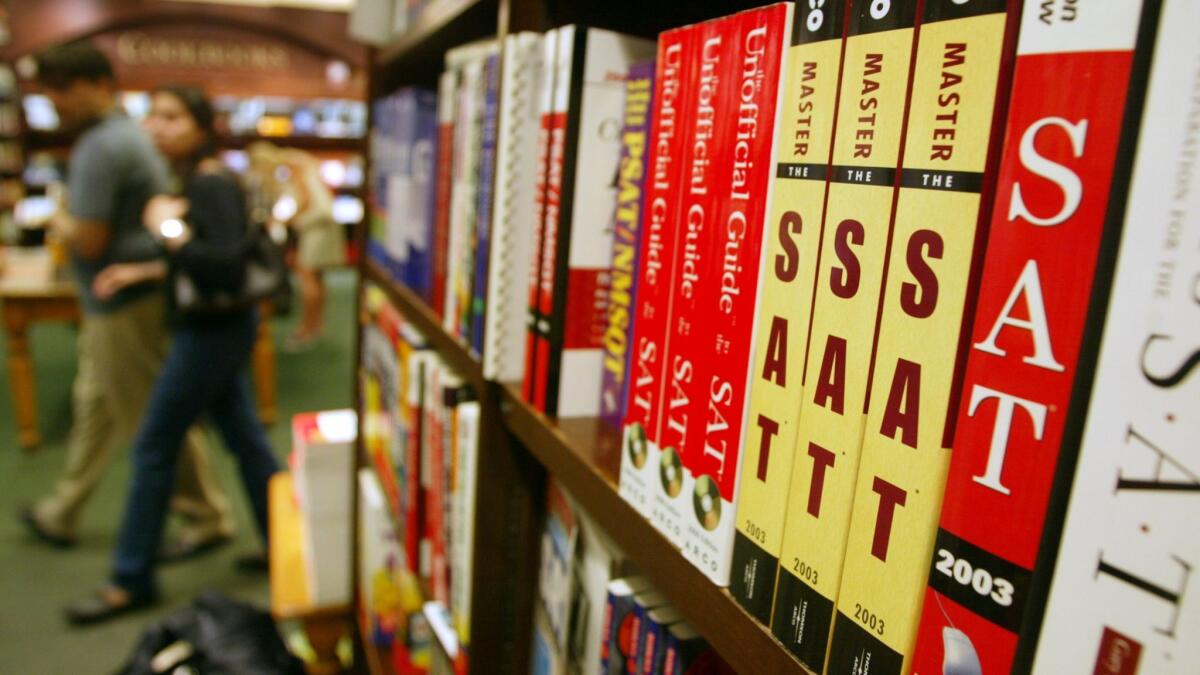UC dropped the SAT and ACT amid coronavirus. Here’s why some want them back next year

- Share via
The University of California suspended SAT and ACT testing requirements for admission next fall amid the coronavirus pandemic — but many faculty members want them back for at least the next five years.
In a letter sent Saturday to UC President Janet Napolitano, the Academic Senate chair reported unanimous backing from the faculty assembly to keep the controversial tests as an admission requirement, approving a recommendation by a task force this year.
The assembly, made up of faculty leadership and campus representatives, endorsed the report 51-0, with one abstention — an overwhelming show of support that sets up a showdown with testing critics next month, when the UC Board of Regents will take up the issue.
The assembly also endorsed the elimination of the SAT essay and ACT writing test as a requirement for UC undergraduate admissions.
The UC system lifted the standardized testing requirement for fall 2021 applicants due to test cancellations amid the pandemic. But that is likely to be a temporary pause, with test scores probably expected for fall 2022 applicants. The ACT still plans to offer a June test, and the College Board, which owns the SAT, hopes to restart tests in August and will do so by fall at the latest, using a digital, at-home exam if needed.
Academic Senate Chair Kum-Kum Bhavnani said faculty members were persuaded, if surprised, by the task force’s findings that the SAT test actually helps disadvantaged students gain entry to the selective UC system. Extensive research has shown that SAT and ACT scores are heavily influenced by race, income and parents’ education level, driving legal challenges to the tests’ use in UC admissions and decisions to make them optional at more than 1,000 colleges and universities.
The task force concluded, however, that the way UC uses standardized test scores substantially corrects for that bias by weighting them less heavily than grades and considering them as only one of 14 factors in a comprehensive review process. Campuses adjust for socioeconomic differences and admit disadvantaged students with lower test scores compared to more advantaged peers, the review found.
“We know there’s a lot of hesitation about the use of standardized tests,” Bhavnani said. “What I want people to understand is that the way that the UC uses these tests protects disadvantaged students and allows for a more diverse student population.”
Some UC researchers, however, have challenged those findings and argued that they were based on methodological errors.
In a new recommendation, Assembly members voted to revisit the testing issue in five years. They also agreed that tests should not be made optional or replaced by the state assessment used for K-12 schools.
In separate comments, faculty bodies at nine of UC’s 10 campuses also supported retaining the tests. UC Irvine could reach no consensus.
UC Merced — whose student body has the system’s largest proportion of low-income, first-generation and underrepresented minority students — said more privileged students could end up benefiting if tests were dropped and high school grades were more heavily weighted. That’s because students can boost their GPA with extra points from Advanced Placement courses, which are more readily available at affluent schools, said the campus diversity and equity committee.
In her letter to Napolitano, Bhavnani said assembly members were persuaded by evidence that test scores were not the primary reason for the underrepresentation of disadvantaged students at UC campuses. Larger factors, she said, included fewer applicants and lower completion of required college preparatory courses.
She said the faculty supports increasing access to more students but also adding academic support, which would require more funding.
Napolitano will use the faculty input to develop her own recommendation to the regents, who are expected to vote on the issue next month.
More to Read
Sign up for Essential California
The most important California stories and recommendations in your inbox every morning.
You may occasionally receive promotional content from the Los Angeles Times.











